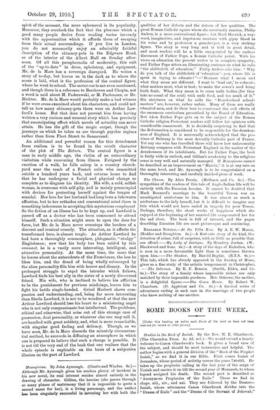Mezzogiorno. By John Ayscough. (Chatto and Winans. Gs.)— Although Mr.
Ayscough gives his readers plenty of incident in his new novel, its real interest resides almost entirely in the drawing of character. Gillian, the heroine (she passes through so many phases of matrimony that it is impossible to quote a second name for her), is a living personage, and the anther has been singularly successful in investing her with both the qualities of her defects and the defects of her qualities. The great Roman Catholic squire whom she eventually marries, Philip Andros, is a more conventional figure ; but Mark Herrick, a way- ward, imaginative, and impetuous creature with gipsy blood in his veins and by profession a gamekeeper, is a very striking figure. The story is very long and is told in great detail, and most readers will be a little exasperated by the endless discourses of Father Pope, a Roman Catholic priest. With his views on education the present writer is in complete sympathy, and Father Pope utters an illuminating sentence on what he calls "the shibboleth of education." Philip Andros asks him : "Why do you talk of the shibboleth of education'—you, whose life is spent in trying to educate ? "—" Because what I mean and what they mean are different. I want to 'lead out,' to e-ducate, what matters most, what is best : to make the sower's seed bring forth fruit. What they mean is to cram unfit bodies (for they take no count of the soul) with unfit food, and too much of it." His strictures on what he calls the "Board-school school- masters" are, however, rather unfair. Many of them are really educated men, and do their best to counteract the evil effects of the enormous curriculum prescribed by the Board of Education. But when Father Pope gets on to the subject of the Roman Catholic religion Protestant readers will follow his opinions with considerable amazement. It is decidedly surprising to find that the Reformation is considered to be responsible for the drunken- ness of England. It is universally acknowledged that the pro- vince of Brittany is the most devoutly Catholic part of France. Yet any one who has travelled there will know how unfavourably Brittany compares with Protestant England in the matter of the drunkenness of its inhabitants. But for Father Pope, the book is fairly wide in outlook, and Gillian's awakening to the religious sense is very well and naturally managed. If Mezzogiorno cannot be described as an improvement on " Marotz," it is at any rate on the same level, and Mr. Ayscough is to be congratulated on a thoroughly interesting and carefully finished piece of work.














































 Previous page
Previous page